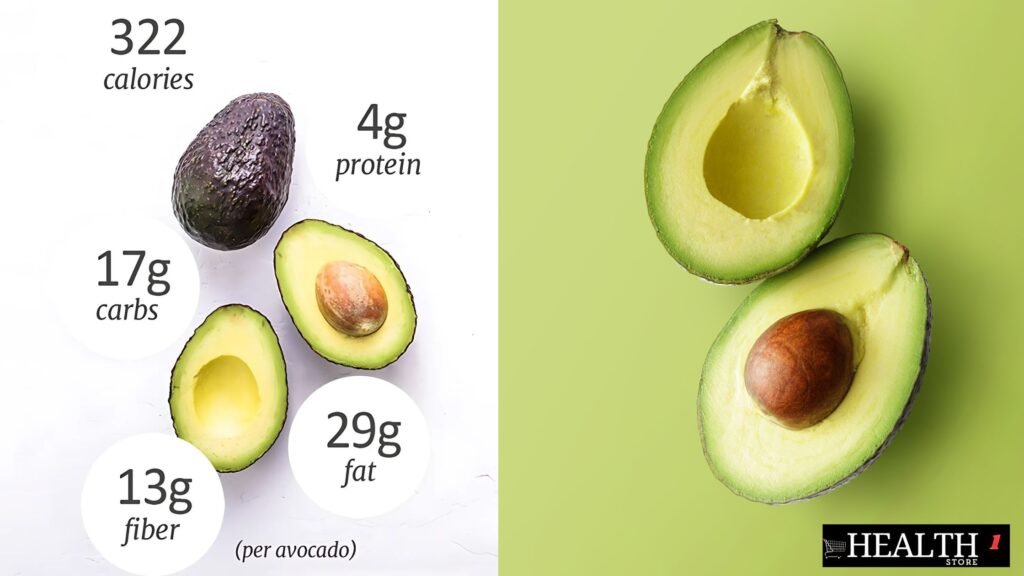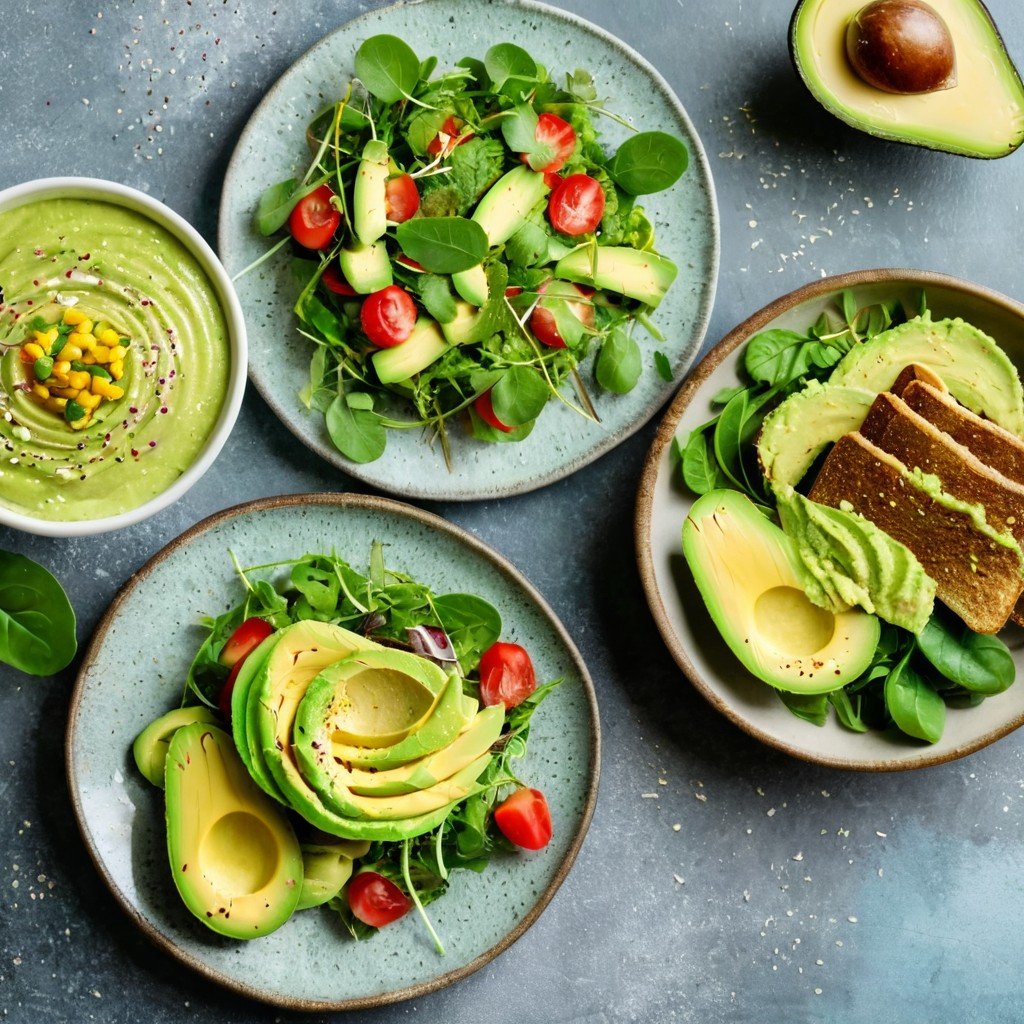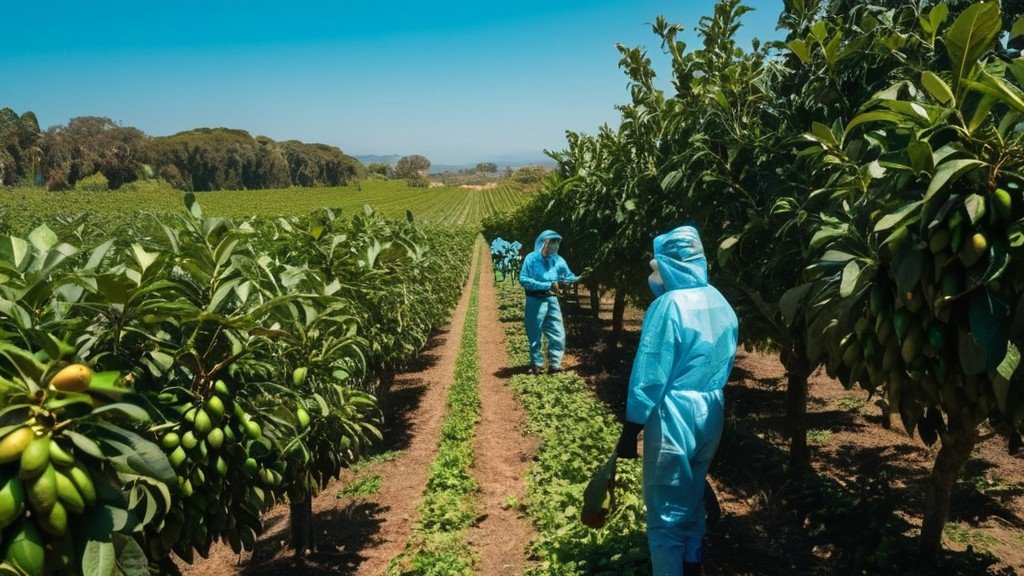Introduction to Avocado Nutrition
Avocados have taken the world by storm, and for good reason. Whether smashed on toast, blended into smoothies, or enjoyed straight from the shell, this creamy fruit is more than just a trendy food—it’s a nutritional powerhouse. But what exactly makes avocados so special? Are they really as healthy as everyone claims, or is it all just hype? If you’ve ever wondered how avocados can benefit your health, how to incorporate them into your meals, or even how to pick the perfect one at the store, you’re in the right place.
We’ll dive deep into the science-backed benefits of avocado nutrition, explore delicious ways to enjoy them, and debunk some common myths. Ready to discover why Avocado Nutrition deserves a permanent spot in your diet? Let’s get started!
Table of Contents
Avocado Nutrition
The Profile of Avocado Nutrition
Regarding nutrition, avocado nutrition is a league of its own. But what exactly makes this vibrant green fruit so nutrient-dense? Let’s break it down and uncover why avocados are often hailed as a superfood.

Key Vitamins and Minerals in Avocados
Avocados are packed with essential vitamins and minerals that support overall health. Here’s a snapshot of what you’ll find in every bite:
- Vitamin K: Crucial for bone health and blood clotting.
- Folate: Supports cell repair and is especially important for pregnant women.
- Potassium: Even more than bananas, avocados help regulate blood pressure and muscle function.
- Vitamin E: A powerful antioxidant that protects your cells from damage.
- Vitamin C: Boosts immunity and promotes healthy skin.
Healthy Fats: The Role of Monounsaturated Fats
One of the standout features of avocado nutrition is its high content of monounsaturated fats. These “good fats” are heart-healthy and can:
- Lower bad cholesterol (LDL) while raising good cholesterol (HDL).
- Reduce inflammation, which is linked to chronic diseases.
- Help your body absorb fat-soluble vitamins like A, D, E, and K.
Fiber Content: Supporting Digestion and Satiety
Did you know that one avocado provides nearly 30% of your daily fiber needs? This makes it a fantastic choice for:
- Digestive health: Fiber keeps your gut happy and regular.
- Weight management: It helps you feel full longer, reducing the urge to snack.
- Blood sugar control: Fiber slows down digestion, preventing spikes in blood sugar levels.
Antioxidants: Protecting Your Body from Oxidative Stress
Avocados are rich in antioxidants like lutein and zeaxanthin, which are particularly beneficial for eye health. These compounds:
- Protect your eyes from harmful blue light and reduce the risk of age-related macular degeneration.
- Combat free radicals, which can damage cells and contribute to aging and disease.
Why Avocado Nutrition Stands Out
What sets avocados apart from other fruits is their unique combination of nutrients. Unlike most fruits, which are high in carbs, avocados provide healthy fats, fiber, and a wide range of vitamins and minerals. This makes them incredibly versatile—whether you’re looking to boost your heart health, improve digestion, or simply enjoy a delicious and satisfying snack.
So, the next time you slice into an avocado, remember: you’re not just enjoying a tasty treat; you’re fueling your body with some of the best nutrition nature ever. Ready to explore the real health benefits of Avocado Nutrition? Let’s keep going!
Health Benefits of Avocado Nutrition
Avocados aren’t just delicious—they’re a powerhouse of health benefits that can transform your well-being. But how exactly does this creamy fruit contribute to a healthier you? Let’s explore the science-backed ways avocado nutrition can enhance your life.
Heart Health: Lowering Cholesterol and Blood Pressure
Your heart loves avocados, and here’s why:
- Rich in Monounsaturated Fats: These healthy fats help reduce bad cholesterol (LDL) while increasing good cholesterol (HDL), promoting a healthier cardiovascular system.
- High in Potassium: With more potassium than bananas, avocados help regulate blood pressure, reducing the risk of stroke and heart disease.
- Packed with Antioxidants: Compounds like vitamin E and glutathione protect your heart by reducing inflammation and oxidative stress.
Weight Management: How Avocados Aid in Healthy Weight Loss
Trying to shed a few pounds? Avocados might be your new best friend. Here’s how they help:
- High Fiber Content: The fiber in avocados keeps you feeling full longer, curbing unnecessary snacking and overeating.
- Healthy Fats for Satiety: Unlike empty calories, the fats in avocados provide sustained energy, helping you stay satisfied between meals.
- Low in Carbs: With only 2-3 grams of net carbs per serving, avocados are a great addition to low-carb or keto diets.
Skin and Hair: Nourishing from the Inside Out
Want glowing skin and luscious hair? Avocado nutrition has you covered:
- Vitamin E and C: These vitamins work together to promote collagen production, keeping your skin firm and youthful.
- Healthy Fats: They moisturize your skin and scalp, reducing dryness and promoting shine.
- Antioxidants: Protect your skin from environmental damage and premature aging.
Blood Sugar Regulation: A Low-Glycemic Superfood
Struggling with blood sugar spikes? Avocados can help stabilize your levels:
- Low Glycemic Index: Avocados won’t cause sudden spikes in blood sugar, making them a safe choice for diabetics or anyone watching their glucose levels.
- Fiber-Rich: Slows down digestion, ensuring a steady release of energy and preventing sugar crashes.
A Bonus Benefit: Brain Health
Avocados are also great for your brain! The monounsaturated fats support cognitive function, while folate and vitamin E may help reduce the risk of neurodegenerative diseases like Alzheimer’s.
Why Avocado Nutrition is a Game-Changer
The health benefits of Avocado Nutrition go far beyond their creamy texture and rich flavor. From supporting your heart to helping you maintain a healthy weight, this superfood is a true multitasker. And the best part? It’s easy to incorporate into your daily meals.
So, whether you’re looking to boost your heart health, achieve glowing skin, or simply feel your best, avocados are a delicious and nutritious way to get there. Ready to learn how to make avocado nutrition a regular part of your diet? Let’s move on to the next section!
How to Incorporate Avocado Nutrition into Your Diet
Love avocados but not sure how to make them a regular part of your meals? You’re in luck! This versatile fruit can be enjoyed in countless ways, from breakfast to dessert. Whether you’re a seasoned avocado enthusiast or just starting to explore its potential, here are some creative and delicious ideas to help you incorporate avocado nutrition into your daily diet.

Simple and Delicious Avocado Recipes
Avocados are incredibly easy to use, and their creamy texture makes them a perfect addition to a variety of dishes. Try these quick recipes:
- Avocado Toast: Mash half an avocado on whole-grain toast, sprinkle with salt, pepper, and a dash of chili flakes for a satisfying breakfast or snack.
- Guacamole: Combine mashed avocados with lime juice, diced tomatoes, onions, cilantro, and a pinch of salt for a crowd-pleasing dip.
- Avocado Salad: Toss avocado slices with mixed greens, cherry tomatoes, cucumber, and a light vinaigrette for a refreshing meal.
Avocado as a Substitute for Unhealthy Fats
Did you know avocados can replace less healthy fats in your cooking? Here’s how:
- Butter Substitute: Use mashed avocado in place of butter on toast or in baking for a nutrient-rich alternative.
- Mayo Replacement: Swap mayo with avocado in sandwiches, wraps, or salads for a creamy, heart-healthy option.
- Salad Dressing Base: Blend avocado with olive oil, lemon juice, and herbs for a creamy, homemade dressing.
Snack Ideas: Quick and Nutritious Options
Need a healthy snack that keeps you energized? Avocados have you covered:
- Avocado Deviled Eggs: Mix avocado with egg yolks for a twist on the classic deviled eggs.
- Avocado Slices with Sea Salt: Sometimes, simplicity is best—just slice and sprinkle with a pinch of sea salt.
- Avocado and Veggie Sticks: Pair avocado slices with carrot, cucumber, or bell pepper sticks for a crunchy, satisfying snack.
Avocado Nutrition in Smoothies and Desserts
Yes, avocados can even be used in sweet treats! Their creamy texture makes them perfect for:
- Smoothies: Blend avocado with spinach, banana, almond milk, and a touch of honey for a creamy, nutrient-packed drink.
- Chocolate Mousse: Combine avocado with cocoa powder, a sweetener of your choice, and a splash of vanilla for a decadent yet healthy dessert.
- Ice Cream: Freeze blended avocado with coconut milk and a natural sweetener for a dairy-free ice cream alternative.
Tips for Adding Avocados to Every Meal
- Breakfast: Add avocado slices to your omelet or scramble.
- Lunch: Top your soup or chili with diced avocado for extra creaminess.
- Dinner: Use avocado as a garnish for grilled chicken, fish, or tacos.
Why Avocado Nutrition Is a Kitchen Staple
Incorporating Avocado Nutrition into your diet isn’t just easy—it’s a game-changer for your health. Their versatility means you’ll never get bored, and their nutritional benefits make every bite worthwhile. Whether you’re whipping up a quick snack or experimenting with new recipes, avocados are here to make your meals healthier, tastier, and more satisfying.
So, what are you waiting for? Grab an avocado and start exploring the endless possibilities today! Up next, we’ll share tips on how to choose and store avocados to keep them fresh and delicious. Stay tuned!
Choosing and Storing Avocados for Maximum Nutrition
Ever brought home an avocado only to find it’s either rock-hard or already overripe? We’ve all been there. But don’t worry—mastering the art of choosing and storing avocados is easier than you think. With a few simple tips, you can enjoy perfectly ripe avocados every time while preserving their nutritional benefits. Let’s dive in!
How to Pick the Perfect Avocado
Choosing the right avocado is the first step to enjoying its creamy goodness. Here’s what to look for:
- Check the Color: Ripe avocados typically have a dark green or nearly black skin, depending on the variety. However, color alone isn’t always a reliable indicator.
- Give It a Gentle Squeeze: Hold the avocado in your palm and apply light pressure. If it yields slightly, it’s ripe and ready to eat. If it’s hard, it needs a few days to ripen. If it feels mushy, it’s overripe.
- Inspect the Stem: Pop off the small stem at the top. If the area underneath is green, the avocado is ripe. If it’s brown, it’s likely overripe.
Ripening Tips: Speeding Up or Slowing Down the Process
Need your avocado to ripen faster? Or maybe you want to delay ripening? Here’s how to control the process:
- To Ripen Faster: Place avocados in a paper bag with a banana or apple. These fruits release ethylene gas, which speeds up ripening.
- To Slow Down Ripening: Store unripe avocados in the refrigerator to pause the ripening process. Once ripe, you can move them to the fridge to extend their freshness for a few more days.
Proper Storage: Keeping Avocados Fresh Longer
Once your avocados are perfectly ripe, proper storage is key to maintaining their texture and nutritional value. Follow these tips:
- Whole, Uncut Avocados: Store at room temperature until ripe, then move to the fridge to slow down further ripening.
- Cut Avocados: To prevent browning, leave the pit in the unused portion, sprinkle the flesh with lemon or lime juice, and wrap tightly in plastic wrap or place in an airtight container.
- Mashed Avocado: Store in a sealed container with a thin layer of water or lemon juice on top to keep it fresh and green.
Freezing Avocados: A Handy Long-Term Solution
Did you know you can freeze avocados? It’s a great way to preserve them for future use:
- For Halves or Slices: Peel and remove the pit, then brush with lemon juice to prevent browning. Place in a freezer-safe bag or container.
- For Mashed Avocado: Mash the avocado, mix in a bit of lemon juice, and freeze in small portions using an ice cube tray.
Why Proper Handling Matters
Choosing and storing avocados correctly isn’t just about convenience—it’s about preserving their nutritional benefits. Avocados are rich in healthy fats, vitamins, and antioxidants, but improper storage can lead to nutrient loss and spoilage. Follow these tips, and you’ll ensure every avocado you enjoy is at its peak flavor and nutritional value.
So, the next time you’re at the store, you’ll know exactly how to pick the perfect avocado and keep it fresh for days. Ready to tackle some common myths about Avocado Nutrition? Let’s clear up the confusion in the next section!
Common Myths and Facts About Avocado Nutrition
Avocados have earned their superfood status, but with popularity comes misinformation. Are avocados really as healthy as they seem, or are they just another food trend? Let’s separate fact from fiction and debunk some of the most common myths about avocado nutrition. By the end of this section, you’ll have a clearer understanding of why this fruit deserves a spot in your diet.
Myth 1: Avocados Are Too High in Calories
The Truth:
While avocados are calorie-dense (about 240 calories per fruit), their calories come from healthy monounsaturated fats, which are essential for heart health and satiety. These fats help you feel full longer, reducing the likelihood of overeating. Plus, the nutrient density of avocados means you’re getting a powerhouse of vitamins, minerals, and antioxidants in every bite.
Myth 2: Avocados Are Fattening
The Truth:
The fats in avocados are not the enemy—they’re actually your ally! Research shows that the monounsaturated fats in avocados can support weight management by promoting satiety and reducing unhealthy cravings. In fact, studies suggest that people who eat avocados regularly tend to have lower body weight and waist measurements.
Myth 3: Avocados Are Only Good for Healthy Fats
The Truth:
Avocados are so much more than just a source of healthy fats. They’re packed with:
- Fiber: Supports digestion and gut health.
- Potassium: Helps regulate blood pressure.
- Antioxidants: Protects your cells from damage.
- Vitamins C and E: Boosts immunity and promotes healthy skin.
Myth 4: Avocados Are Not Suitable for Diabetics
The Truth:
Avocados are actually a great choice for people with diabetes. Their low glycemic index means they won’t cause blood sugar spikes, and the high fiber content helps regulate glucose levels. Plus, the healthy fats can improve insulin sensitivity, making avocados a diabetes-friendly food.
Myth 5: All Avocados Are the Same
The Truth:
Not all avocados are created equal. The most common variety, Hass avocados, are known for their creamy texture and rich flavor. However, other varieties like Fuerte and Bacon have slightly different nutrient profiles and tastes. Regardless of the type, all avocados offer impressive health benefits.
Myth 6: Avocado Skins and Pits Are Useless
The Truth:
While you shouldn’t eat the skin or pit, they’re not entirely useless. Some people use avocado pits to make natural dyes or even grind them into powder for DIY skincare treatments. However, the flesh is where the real nutritional magic happens, so focus on enjoying that!
Why These Myths Matter
Understanding the truth about avocado nutrition helps you make informed choices about your diet. Avocados are a nutrient-dense, versatile food that can benefit nearly everyone—whether you’re looking to improve heart health, manage your weight, or simply enjoy delicious, wholesome meals.
So, the next time someone tells you avocados are “too fatty” or “fattening,” you’ll know exactly how to set the record straight. Ready to explore the environmental impact of avocado consumption? Let’s move on to the final section!
The Environmental Impact of Avocado Consumption
Avocados are a nutritional powerhouse, but have you ever stopped to think about their environmental footprint? As demand for this superfood skyrockets, it’s important to consider how avocado production affects the planet. From water usage to deforestation, let’s explore the environmental impact of avocado consumption—and what you can do to enjoy them responsibly.

The Water Footprint of Avocado Production
Avocados are notoriously thirsty crops. Here’s what you need to know:
- High Water Demand: It takes approximately 70 liters of water to grow just one avocado. In regions where water is scarce, this can strain local resources.
- Impact on Local Communities: In some areas, avocado farming has led to water shortages, affecting both people and ecosystems.
Deforestation and Habitat Loss
The global avocado boom has led to some unintended consequences:
- Clearing Forests: In countries like Mexico, the world’s largest avocado producer, forests are being cleared to make way for avocado orchards. This destroys wildlife habitats and reduces biodiversity.
- Soil Degradation: Intensive farming practices can deplete soil nutrients, making it harder for the land to recover and support other crops.
Carbon Footprint: The Journey from Farm to Table
Avocados don’t just grow locally for most of us—they often travel long distances to reach your plate:
- Transportation Emissions: Avocados imported from Mexico, Chile, or Peru have a significant carbon footprint due to transportation.
- Packaging Waste: Many avocados are shipped in plastic packaging to prevent damage, adding to the environmental toll.
Sustainable Farming Practices
The good news? Some farmers are adopting eco-friendly methods to reduce the environmental impact:
- Organic Farming: Avoids synthetic pesticides and fertilizers, promoting healthier soil and ecosystems.
- Water Conservation: Techniques like drip irrigation and rainwater harvesting help reduce water usage.
- Agroforestry: Integrating avocado trees with other crops or forests can preserve biodiversity and improve soil health.
How You Can Make a Difference
As consumers, we have the power to drive change. Here’s how you can enjoy avocados more sustainably:
- Choose Local: Opt for avocados grown closer to home to reduce transportation emissions.
- Support Ethical Brands: Look for certifications like Fair Trade or Rainforest Alliance, which promote sustainable farming practices.
- Reduce Waste: Use every part of the avocado, and compost the skin and pit if possible.
- Eat Seasonally: Avocados have peak growing seasons—buying them during these times can reduce the need for energy-intensive storage and transportation.
The Bigger Picture: Balancing Health and Sustainability
Avocados offer incredible health benefits, but it’s important to weigh these against their environmental impact. By making informed choices and supporting sustainable practices, you can enjoy this superfood while minimizing your ecological footprint.
So, the next time you slice into an avocado, take a moment to appreciate not just its creamy texture and rich flavor, but also the journey it took to reach your plate—and how you can help make that journey more sustainable.
And with that, we’ve covered everything from avocado nutrition to their environmental impact. Whether you’re a longtime fan or new to the avocado craze, we hope this guide has inspired you to enjoy this superfood in a way that’s good for you and the planet. Bon appétit!
Conclusion of The Avocado Nutrition
Avocados are more than just a trendy food—they’re a nutritional powerhouse, a versatile kitchen staple, and a delicious way to support your health. From their heart-healthy fats and fiber-rich goodness to their role in glowing skin and stable blood sugar levels, it’s clear why this creamy fruit has earned its superfood status. But as we’ve explored, enjoying avocados isn’t just about reaping their benefits; it’s also about making mindful choices that consider their environmental impact.
So, what’s the takeaway? Whether you’re spreading avocado on toast, blending it into a smoothie, or using it as a butter substitute, you’re not just treating your taste buds—you’re nourishing your body with essential nutrients. And by choosing sustainably sourced avocados and supporting ethical farming practices, you’re also contributing to a healthier planet.
As you incorporate avocados into your diet, remember that balance is key. Enjoy them as part of a varied, whole-foods-based diet, and take pride in knowing that you’re making choices that benefit both your well-being and the environment.
Ready to take the next step? Start by picking up a perfectly ripe avocado, trying a new recipe, or simply savoring one as a snack. Your body—and the planet—will thank you. Here’s to enjoying avocados in a way that’s as good for you as it is for the world around us. Cheers to your health!
References
Nutrition and Health Benefits
- Harvard T.H. Chan School of Public Health: “Avocados: Nutrition, Recipes, and More.” https://www.hsph.harvard.edu/nutritionsource/avocados/
- Mayo Clinic: “Dietary Fiber: Essential for a Healthy Diet.” https://www.mayoclinic.org/healthy-lifestyle/nutrition-and-healthy-eating/in-depth/fiber/art-20043983
- American Heart Association: “Monounsaturated Fat.” https://www.heart.org/en/healthy-living/healthy-eating/eat-smart/fats/monounsaturated-fats
Environmental Impact
- World Wildlife Fund (WWF): “Sustainable Agriculture: Avocado Farming.” https://www.worldwildlife.org/industries/sustainable-agriculture
- Food and Agriculture Organization (FAO): “Water Use in Agriculture.” https://www.fao.org/3/a-i7959e.pdf
- Rainforest Alliance: “Sustainable Avocado Farming: Challenges and Solutions.” https://www.rainforest-alliance.org/articles/sustainable-avocado-farming
Recipes and Culinary Uses
- BBC Good Food: “Avocado Recipes.” https://www.bbcgoodfood.com/recipes/collection/avocado-recipes
- Minimalist Baker: “10-Minute Vegan Avocado Chocolate Mousse.” https://minimalistbaker.com/10-minute-vegan-avocado-chocolate-mousse/
Sustainability and Ethical Sourcing
- Fair Trade Certified: “What Does Fair Trade Mean for Avocados?” https://www.fairtradecertified.org/
- Carbon Footprint Ltd: “Understanding the Carbon Footprint of Food.” https://www.carbonfootprint.com/




